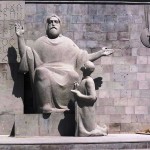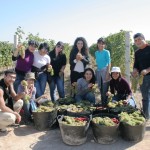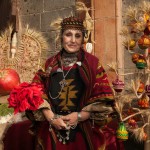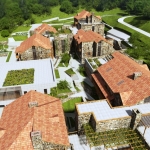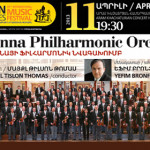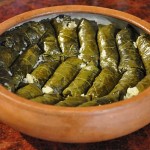“Happy New Year” – this is one of the favourite and wide spread phrases among the Armenians so often heard at the New Year Celebrations. The ancient Armenians, together with all the peoples, had been celebrating the coming of the New Year in spring, as they prepared huge feasts to welcome and celebrate the zenith of the nature. God of the New Year Vanatur was considered to be the nurse of all the Armenians and the custodian of the gardens and fruit. But gradually at the medium of the 18th century all Armenians adopted the 1st of January as the official first day of the New Year, and the 6th of January – Feast of the Holy Nativity. In Armenia it was a custom that on New Year’s Eve, children gathered in-groups and went around their village, singing songs and greeting the New Year by singing to their neighbors. As usual, sons
were to congratulate elders, workmen – masters, pupils – teachers and etc. The children usually received lots of dried fruits, raisins, different kinds of nuts, gahin as presents. This tradition was known as “Kakhou”. “Kakhouk” or “Gotekakh”.
The religious belief of the “FIRST” was considered to be one of the wide-spoken themes at the celebrations, as it was predicted that if a good-natured, honest and kind person was the first to enter a house the year for the family would be prosperous, happy and successful. A number of foreign attributes related to the New Year have entered into the Armenian traditions, such as Santa Clause, Snowman or Christmas tree, which are so important and expected for the kids especially.
On January 6, the Armenian Apostolic Church celebrates the Feast of the Holy Nativity and Theophany of Our Lord Jesus Christ, which is the commemoration of the Birth and Baptism of Jesus Christ. Both Theophanies revealed by means of the Birth and Baptism of Jesus Christ is celebrated in the Armenian Church jointly
on January 6. A solemn Divine Liturgy is celebrated, at the conclusion of which Blessing of the Waters Service is conducted. The Holy Chrism drop by drop into water and blesses the water.
According to the tradition people take some blessed water with them to use it as a medicinal remedy for the sick. After Blessing of the Waters Service the priests visit the houses of the faithful to proclaim
the Christmastide Good News of the Birth of Jesus Christ and hence the tradition of Blessing of the Houses was formed.



